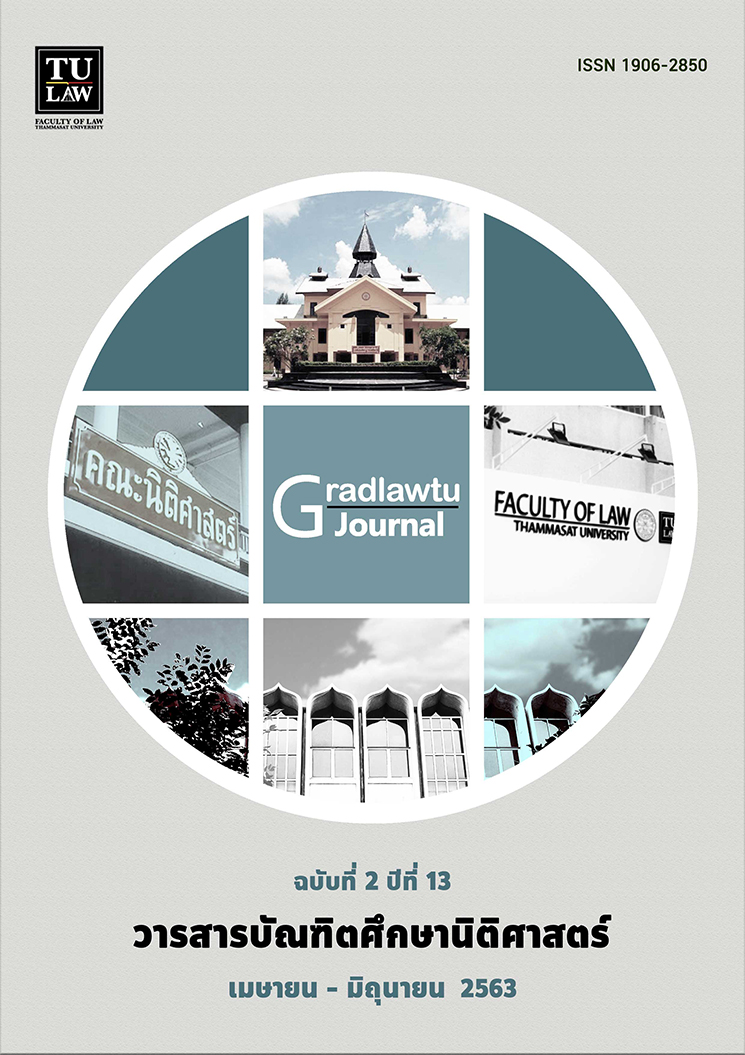ความร่วมมือระหว่างประเทศทางอาญา : ศึกษากฎหมายไทย กรณีการส่งผู้ร้ายข้ามแดนในอาเซียน
คำสำคัญ:
ความร่วมมือระหว่างประเทศทางอาญา, ส่งผู้ร้ายข้ามแดน, หลักการปฏิบัติในทางซึ่งกันและกันบทคัดย่อ
การส่งผู้ร้ายข้ามแดนในอาเซียน ตามกฎหมายไทยกับประเทศที่ไม่มีสนธิสัญญา มีเงื่อนไขให้ประเทศผู้ร้องขอ ทำหนังสือรับรองผลประโยชน์ ตามหลักการปฏิบัติในทางซึ่งกันและกันทำให้เกิดปัญหาปฏิเสธการส่งผู้ร้ายข้ามแดนกับประเทศที่มีกฎหมายภายใน ห้ามการทำหนังสือนั้น ตามด้วยปัญหาอำนาจในการดำเนินคดีหลังจากการปฏิเสธการส่งผู้ร้ายข้ามแดนแล้ว ซึ่งจากการศึกษาเปรียบเทียบกฎหมายต่างประเทศ พบว่าการกำหนดเงื่อนไข เป็นการปิดกั้นความร่วมมือกับประเทศที่ใช้ระบบกฎหมายคอมมอนลอว์ คือบรูไนกับสิงคโปร์ และเมื่อปฏิเสธแล้ว ก็ไม่สามารถดำเนินคดีกับผู้ถูกกล่าวหาได้ครอบคลุมทุกฐานความผิดที่สามารถส่งผู้ร้ายข้ามแดนได้ และกรณีที่ไม่มีจุดเกาะเกี่ยวกับไทย ก็ไม่สามารถดำเนินคดีได้ตามกฎหมายไทย ดังนั้นจึงควรแก้ไขการกำหนดเงื่อนไขกรณีที่ไม่มีสนธิสัญญาและให้อำนาจดำเนินคดีกับบุคคลที่ไทยปฏิเสธการส่งผู้ร้ายข้ามแดนแล้ว เพื่อให้สอดคล้องตามหลัก aut dedere aut judicare กล่าวคือให้มีการส่งผู้ร้ายข้ามแดน หรือ มิฉะนั้นรัฐที่พบตัวผู้กระทำความผิด ก็ต้องฟ้องคดีต่อผู้กระทำความผิด เพื่อทำให้การปราบปรามอาชญากรรมภายในอาเซียนบรรลุผล
เอกสารอ้างอิง
2.คณิต ณ นคร. กฎหมายวิธีพิจารณาความอาญา. พิมพ์ครั้งที่ 9. กรุงเทพฯ: วิญญูชน, 2561.
3.ปกป้อง ศรีสนิท. กฎหมายอาญาชั้นสูง , พิมพ์ครั้งที่ 1. กรุงเทพฯ: วิญญูชน, 2559.
4.Bassiouni, M. Cherif. International extradition and world public order. Netherlands : Siithoff, 1974.
5.Bassiouni, M. Cherif. International extradition : United States law and practice. 6th ed, Oxford : Oxford University Press, 2014.
6.Brownlie, Ian. Principles of public international law. 3d ed. Oxford : Clarendon Press, 1979.
7.Cambridge. An introduction to international criminal law and procedure / International criminal law and procedure Robert Cryer ... [et al.]. 2nd ed. U.K. : Cambridge University Press, 2011.
8.Friedmann, Wolfgang Gaston. The changing structure of international law. New York : Columbia University Press, 1964.
9.UNODC, “Model Laws and Treaties.” accessed December 12, 2019. https://www.unodc.org/unodc/ en/legal-tools/model-treaties-and-laws.html#organized _crime,
ดาวน์โหลด
เผยแพร่แล้ว
ฉบับ
ประเภทบทความ
สัญญาอนุญาต
บทความหรือข้อความคิดเห็นใด ๆ ที่ปรากฏในวารสารบัณฑิตศึกษานิติศาสตร์เป็นความรับผิดชอบของผู้เขียนบทความโดยเฉพาะ คณะนิติศาสตร์ มหาวิทยาลัยธรรมศาสตร์ และกองบรรณาธิการไม่จำเป็นต้องเห็นด้วย



